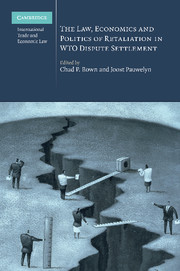Book contents
- Frontmatter
- Contents
- List of tables and figures
- Contributors
- Introduction: trade retaliation in WTO dispute settlement: a multi-disciplinary analysis
- PART I Background and goal(s) of WTO retaliation
- 1 The nature of WTO arbitrations on retaliation
- 2 The calculation and design of trade retaliation in context: what is the goal of suspending WTO obligations?
- 3 Extrapolating purpose from practice: rebalancing or inducing compliance
- PART II A legal assessment after ten arbitration disputes
- PART III An economic assessment after ten arbitration disputes
- PART IV The domestic politics and procedures for implementing trade retaliation
- PART V Problems and options for reform
- PART VI New frontiers and lessons from other fields
- Index
1 - The nature of WTO arbitrations on retaliation
Published online by Cambridge University Press: 26 February 2010
- Frontmatter
- Contents
- List of tables and figures
- Contributors
- Introduction: trade retaliation in WTO dispute settlement: a multi-disciplinary analysis
- PART I Background and goal(s) of WTO retaliation
- 1 The nature of WTO arbitrations on retaliation
- 2 The calculation and design of trade retaliation in context: what is the goal of suspending WTO obligations?
- 3 Extrapolating purpose from practice: rebalancing or inducing compliance
- PART II A legal assessment after ten arbitration disputes
- PART III An economic assessment after ten arbitration disputes
- PART IV The domestic politics and procedures for implementing trade retaliation
- PART V Problems and options for reform
- PART VI New frontiers and lessons from other fields
- Index
Summary
Novelties in the WTO dispute settlement system
The dispute settlement system established by the WTO Agreement and set forth in the Dispute Settlement Understanding (DSU) is one of the major achievements of the Marrakesh Agreement of 1994. The establishment of what is in substance a compulsory and exclusive third-party adjudication based on law to settle all disputes arising under the WTO Agreement and its annexes among the WTO members is a key feature of the ‘rule-based’ WTO, as opposed to the more soft and ‘power-based’ GATT. At the same time the mechanism did not go as far as full judicialization: it resorts to a combination of diplomatic means (the initial consultations), arbitral and judicial organs (the panels and the Appellate Body) and the bestowing of overall and final responsibility upon the political organs of the WTO, mainly the Dispute Settlement Body (DSB) within a strictly defined mandate (‘automatic’ adoption of the reports).
There are two other novelties worth underlining. The first is that this system is unique among specific regimes established to govern definite sectors of international relations beyond regional arrangements. The law of the sea regime as governed by the UNCLOS Convention of 1982 includes a court, that is, the Tribunal of the Law of the Sea. Its competence is, however, quite limited and there is no obligation for the parties to the Convention to resort to its jurisdiction except for narrowly defined types of disputes.
The second feature, which is more central to our examination and discussion, concerns the implementation of the decisions of the panels and the Appellate Body, once adopted by the DSB.
- Type
- Chapter
- Information
- Publisher: Cambridge University PressPrint publication year: 2010
- 2
- Cited by



